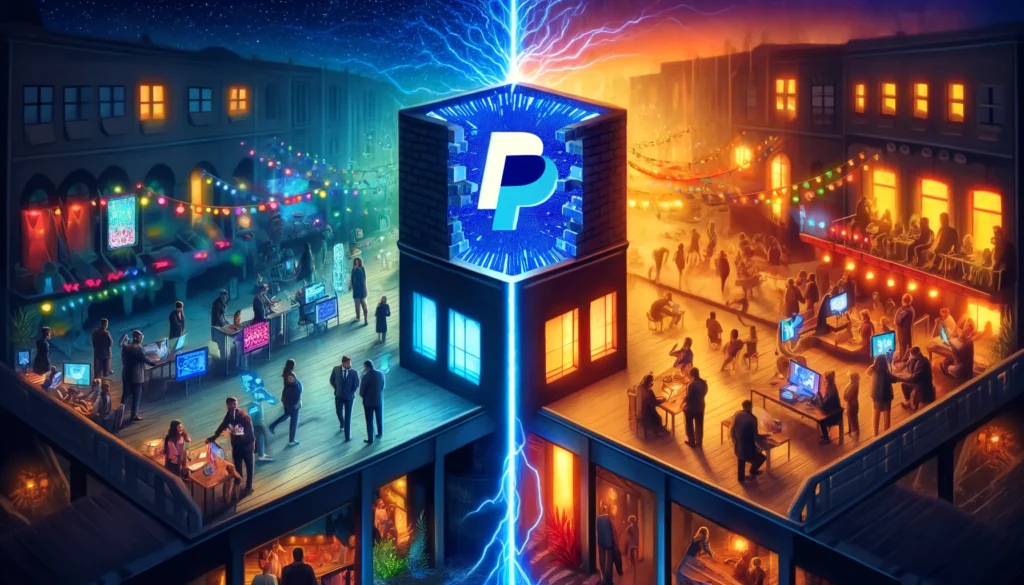-
In May, PayPal NFT purchases halted due to its buyer and seller protection policies.
-
PayPal’s Seller Protection Program will no longer cover high-value NFT transactions over $10,000.01.
-
In the NFT community, policy changes may influence purchasing behavior and risk management.
In a significant update set to take effect on May 20, PayPal, the multinational payment services giant, has quietly amended its policies regarding nonfungible tokens (NFTs), signaling a shift in its approach to digital collectibles.
Under the revised Purchase Protection Program, PayPal will exclude NFT purchases from buyer and seller protection coverages. This move, outlined in the company’s upcoming policies page, marks a notable departure from its stance on NFT transactions.
Furthermore, PayPal’s Seller Protection Program will undergo adjustments, with transactions involving NFTs valued at $10,000.01 or above being excluded from coverage.
This adjustment implies that high-value NFT sales may no longer enjoy PayPal’s guarantee against false claims, chargebacks, or scams, potentially leaving sellers vulnerable to financial losses.
PayPal NFT: Implications and Industry Updates
The implications of PayPal NFT policy changes extend beyond individual transactions, impacting the broader NFT ecosystem and its participants.
As the popularity of NFTs continues to rise, particularly within digital art and collectibles, the absence of PayPal’s protections may influence purchasing behavior and risk management strategies within the community.
In other news, within the NFT space, Stepn, a move-to-earn gaming platform, has partnered with renowned shoe retailer Adidas to release co-branded sneaker NFTs on the Solana network.
This partnership, described as “long-term,” aims to offer the Stepn community a holistic experience through various activations, leveraging digital assets to promote healthier and more active lifestyles.
ALSO, READ; PayPal Holdings moves towards facilitating a royalty-friendly NFT marketplace.
The sneaker NFTs, priced at approximately 10,000 GMT tokens, signify the intersection of fashion, gaming, and blockchain technology, highlighting the growing convergence of digital and physical realms.

Meanwhile, luxury fashion house Louis Vuitton has unveiled its latest offering: a varsity jacket priced at approximately $8,400 and a corresponding digital collectible NFT.
Designed by acclaimed record producer and singer-songwriter Pharrell Williams, the coat forms part of Louis Vuitton’s Via NFT project, which aims to bridge the gap between physical fashion and digital ownership. With a suede buckskin construction and an embroidered brand logo, the jacket exemplifies the fusion of traditional craftsmanship with cutting-edge technology.
This release follows Louis Vuitton’s previous endeavors in the NFT space, including a high-end bag and digital mini trunk exclusively available to Via NFT holders. Integrating digital collectibles into luxury fashion represents a paradigm shift in consumer engagement and brand interaction, offering collectors a unique blend of tangible luxury and digital exclusivity.
ALSO, READ; PayPal Holdings moves towards facilitating a royalty-friendly NFT marketplace.
Expanding on the implications of PayPal NFT policy changes, the decision to exclude NFT transactions from buyer and seller protections reflects the evolving regulatory landscape surrounding digital assets.
As NFTs gain mainstream attention and adoption, regulatory authorities scrutinize their potential risks and consumer protections. PayPal’s move may proactively respond to regulatory concerns, aiming to mitigate potential liabilities associated with NFT transactions while ensuring compliance with evolving regulations.
Furthermore, the exclusion of high-value NFT transactions from PayPal’s Seller Protection Program underscores the unique challenges digital collectibles pose regarding authenticity and dispute resolution.
Unlike traditional physical goods, NFTs are inherently digital and often lack tangible proof of ownership, making them susceptible to fraud and disputes. By delineating thresholds for coverage, PayPal seeks to manage risk exposure and safeguard its platform’s integrity.
In contrast, the collaboration between Stepn and Adidas highlights the growing synergy between fashion, gaming, and blockchain technology.
By leveraging NFTs as incentives within a move-to-earn gaming framework, Stepn and Adidas aim to gamify fitness activities while rewarding participants with exclusive digital collectibles. This innovative approach enhances user engagement and taps into the burgeoning market for virtual goods and experiences.
Similarly, Louis Vuitton’s integration of digital collectibles into its luxury fashion offerings underscores the increasing demand for unique and personalized experiences among consumers.
With the rise of digital ownership and virtual identities, luxury brands are exploring new avenues to connect with tech-savvy audiences and differentiate their products in a crowded marketplace.
The Via NFT project exemplifies Louis Vuitton’s commitment to innovation and digital transformation, catering to a new generation of affluent consumers seeking authenticity and exclusivity in both the physical and digital realms.
As the NFT ecosystem evolves, industry players must address critical security, interoperability, and sustainability challenges. Innovations in blockchain technology, such as scalable solutions and environmental-friendly protocols, are essential to unlocking the full potential of NFTs while addressing concerns around energy consumption and carbon footprint.
In summary, PayPal’s decision to revise its policies regarding NFTs underscores the evolving landscape of digital commerce and the increasing prominence of blockchain-based assets.
As industry players navigate these changes, collaborations between fashion brands and NFT platforms blur the physical and digital realms, heralding a new era of innovation and creativity in digital collectibles.
